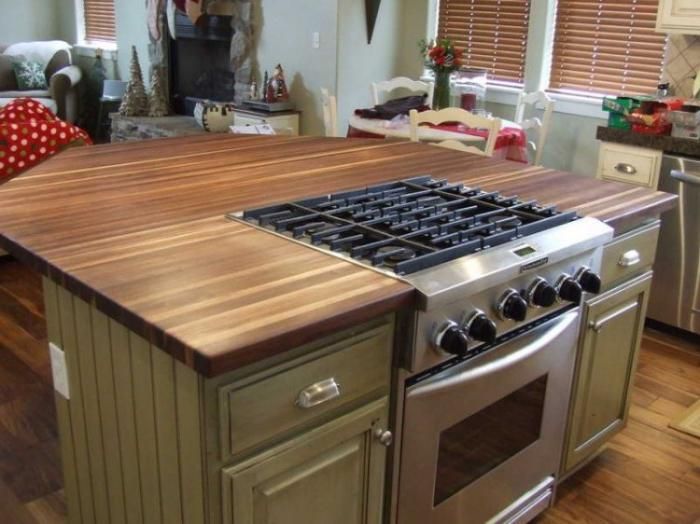Personal safety when using a gas stove
When purchasing a gas stove, you need to remember its operating principles. Since, despite the huge number of advantages, there is also a disadvantage - the danger of fire. To prevent this from happening, you need to ensure your safety. In case of improper operation or various disasters, the residents of the house and users of the devices bear responsibility.
The content of the article
Rules for using a gas stove
 For personal safety, you should be guided by accepted beliefs that the taps on the stove are closed. If you operate the device correctly, the flame of the light will be calm and have a bluish tint. In addition, the fire should not escape from under the cookware. When finishing work, do not forget to close the burner tap, and when you finish using the stove, do not forget to close the tap on the gas pipeline. Your personal safety when using a gas stove depends on this.
For personal safety, you should be guided by accepted beliefs that the taps on the stove are closed. If you operate the device correctly, the flame of the light will be calm and have a bluish tint. In addition, the fire should not escape from under the cookware. When finishing work, do not forget to close the burner tap, and when you finish using the stove, do not forget to close the tap on the gas pipeline. Your personal safety when using a gas stove depends on this.
- Each technique comes with instructions for use. You need to familiarize yourself with it.
- Under no circumstances should you pinch the access to the gas tap and pipes when using the stove.
- Do not allow hoses to be pinched or stretched.
- Do not leave burning appliances unattended; you should constantly monitor the boiling process of various liquids when using the stove.
- When cooking, do not close the windows and leave the door gently open. The room must be constantly ventilated.
- Do not allow water to flood the stove table, and do not touch it with wet hands.
- It is prohibited to independently repair, replace or gasify appliances or cylinders in the apartment.
- It is not allowed to use gas for purposes other than its intended purpose, for example, to heat a home.
- It is also prohibited to sleep or spend free time where household gas units are used.
- Faulty devices are not allowed to operate.
- Do not make temporary wire connections.
- Do not clutter the equipment with foreign objects, or place objects next to it that can quickly catch fire. It can be various rags, paper.
- Keep children away from the unit.
What to do if you smell gas
 If you feel it, then you need to do everything possible to prevent an explosion from occurring. The algorithm is as follows: leave cooking on this stove, turn off the gas taps. Electric lighting and electric bells must not be used. After this, ventilate the room and immediately call the emergency service at number 04.
If you feel it, then you need to do everything possible to prevent an explosion from occurring. The algorithm is as follows: leave cooking on this stove, turn off the gas taps. Electric lighting and electric bells must not be used. After this, ventilate the room and immediately call the emergency service at number 04.
While the special service is getting to your home, you must immediately tell the residents of the house about what happened. Until leaks are eliminated, it is prohibited to carry out operations that involve fire or sparking. For example, smoking, trying to turn on electrical appliances.
How to protect your home from gas leaks
As mentioned above, you should not cover pipes and chimneys with decorative walls or kitchen furniture.
- Never use the device to provide heat to an apartment at home. This feature can be very dangerous.In addition, if you use fire to dry clothes, it can quickly ignite.

- Ventilation is a guarantee of safety. It must work.
- If you do not have special knowledge in the field of gas appliances, then entrust everything to professionals. For your own good, you can only call them so that they can check and eliminate the defects. Because even with the slightest shortage, gas can constantly flow, although this will happen unnoticed.
- It is possible to install a special-purpose ring with high ribs so that the cookware is significantly larger than the diameter of the burner. They provide relief from the necessary air flow and also provide combustion exhaust for products.
- Make sure the gas burns quietly.
- Installing a device - a sensor that is triggered when there is a leak and sends a message to your mobile phone with this information. Or buy an alarm system, it is inexpensive. In both cases, safety will be guaranteed.
- Take time to properly install pipes and carry out preventive maintenance.
Symptoms of carbon monoxide poisoning
IMPORTANT! Poisoning occurs gradually, so it is difficult to notice.
TO symptoms Can attribute:
- pain in temples;
- noise in ears;
- discomfort in the frontal part of the head;
- darkening of the eyes;
- development of muscle weakness, especially in the legs;
- the person cannot get up;
- colic in the head intensifies, difficulty breathing occurs, followed by nausea and vomiting;
- the last stage may be a stunned state and loss of consciousness.
Be careful, there have been fatal cases of poisoning of entire families as a result of prematurely closing a pipe valve.
However, it is worth remembering that the severity of the damage is directly related to factors such as physical activity at the time the substance entered the body, duration of exposure, health status and characteristics of human physiology.

There are three stages:
- Easy degree. Characterized by general weakness, tachycardia, nausea, dizziness, blurred vision. Watery eyes and increased blood pressure may also occur.
- Average. She begins to hallucinate. The person experiences irregular breathing and uncoordinated movements. Consciousness is already in a state of fog. In general, all signs from the first stage begin to occur in complex forms.
- The last stage is the hardest. The pupils dilate, the pulse increases to the maximum. Coma or long-term loss of sanity is possible. Some people experience paralysis, seizures, and involuntary bowel movements. Cyanosis appears on the skin.
Knowing all the symptoms of poisoning, you can prematurely suspect what is causing certain ailments.





